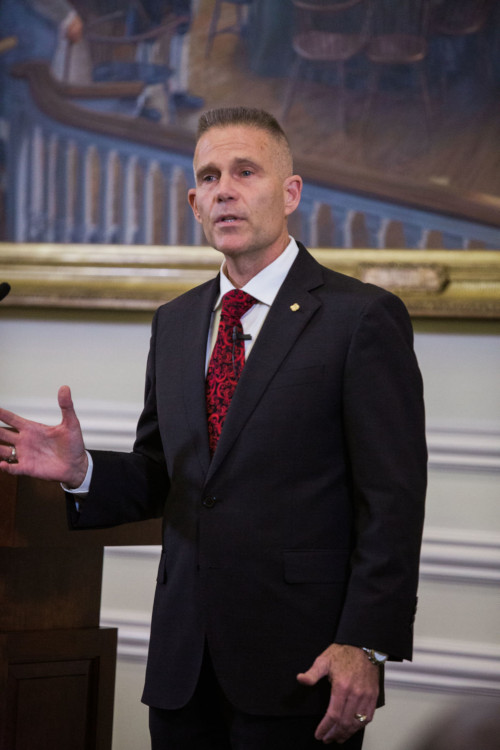
By Krystina Skurk
Hillsdale in D.C. was honored to host Lieutenant General Steven L. Kwast for his lecture, “The Urgent Need for a U.S. Space Force.” Lt. Gen. Kwast is the commander of the Air Education and Training Command at the San Antonio-Randolph Base in Texas and has a master’s degree in public policy from Harvard’s Kennedy School of Government.
“The power of space will change world power forever,” Kwast told the audience assembled at the Allan P. Kirby Jr. Center for Constitutional Studies and Citizenship on November 20th. “As a historian, reflecting on the fact that throughout the history of mankind… technology has always changed world power,” he said.
In his talk Kwast laid out an ambitious vision for innovation in space. He described space as a new frontier for energy, manufacturing, information technology, and transportation. Kwast pointed to World War I as an instance where ignoring a new technology led to catastrophe. “But the story of rejecting new and holding and clinging to the paradigms of the past is why no civilization has ever lasted forever, and values are trumped by other values when another civilization figures out a way of finding a competitive advantage,” Kwast explained.
“The nature of power, you either have it and your values rule or you do not have it and you must submit. We see that play out again and again in history and it's playing out now,” Kwast said referring to China’s current plan to dominate space innovation by 2049.
Kwast believes that a Space Force is crucial to ensuring that America does not get behind in the competition for development in space. He argued that the energy market, the transportation economy, information technology, and new manufacturing will be dominated by the country that takes advantage of what he calls a “new marketplace.”
He also argued that whenever there is a new marketplace there needs to be a guardian force to bring order and predictability to that marketplace or there will be violence and theft. He pointed out that China is already building such a guardian force- the equivalent of a navy fleet for space. If the U.S. allows China to take on this role then China will also be the one setting the rules.
Kwast argues that if the U.S. is in the driver’s seat the market will reflect the values of our Constitution and individual rights, but if China sets the rules the market will look more like subordination and the subversion of human dignity and liberty.
Kwast’s call for a Space Force is an urgent one. He points at 5G as an example of China stealing American ideas and technology, duplicating them and then dominating the market. He does not want the same thing to happen with the new opportunities in the space industry. This, he argues, is why we need a Space Force and soon.
He argues that if China becomes dominant in space they will put roadblocks in place for the countries that come after them. Whoever gets there first will have the ultimate strategic high ground, he argues. “They are building that infrastructure. They are unapologetic about it, and they plan on declaring victory as the dominant world power in space at the 100-year anniversary, 2049,” Kwast stated.
“Why do we need a space force?” Kwast asked. “Because it's an economic competition for the values of the future,” he finished.